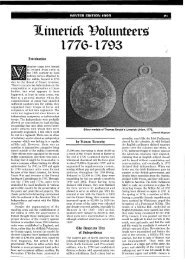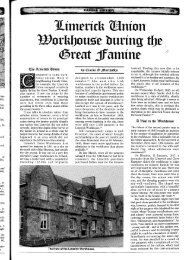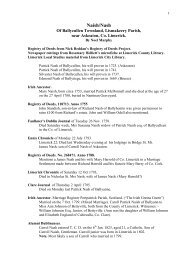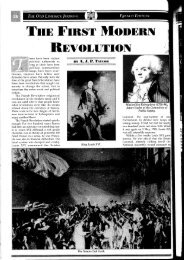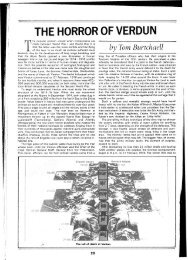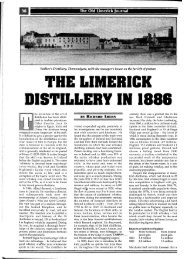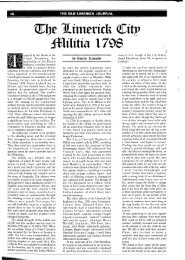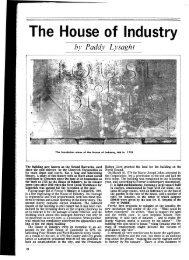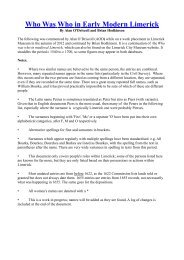pages 555 to 683 (4602 Kb) - Limerick City Council
pages 555 to 683 (4602 Kb) - Limerick City Council
pages 555 to 683 (4602 Kb) - Limerick City Council
You also want an ePaper? Increase the reach of your titles
YUMPU automatically turns print PDFs into web optimized ePapers that Google loves.
592 HISTORY OF LIMERICK.<br />
h .<br />
aries of St. Vincent de Paul <strong>to</strong> this country. 8 3 a 'matter of course, he<br />
joined the Supreme <strong>Council</strong> of the Confederates as a spiritual peer, and in that<br />
capacity secured for himself the esteem of the Pope's nunzio, who in one of<br />
his earliest despatches <strong>to</strong> the Roman Court, speaks of him in a strain of the<br />
highest praise. Another letter, dated <strong>Limerick</strong>, July 16, 1646, and addressed<br />
by the same personage <strong>to</strong> Cardinal Panfilio, mentions the Bishop of <strong>Limerick</strong><br />
taking part in the grand function solemnized in his cathedral, in thanksgiving<br />
for the memorable vic<strong>to</strong>ry which Owen O'Neill had won at Benburb on<br />
thc 5th of the preceding month. ' At four o'clock, p.m.' writes the nunzio,<br />
' the proccseion rnovcd from the Church of St. Francis, where the thirty-two<br />
stands of colours (taken from the Scotch) had been deposited. The garrison<br />
of <strong>Limerick</strong> led the van, and the captured colours were carried by the nobility<br />
of the city. Then followed the nunzio, the Archbishop of Cashel, the Bishops<br />
of Linlerick, Clonfert, and Ardfert, and after them the Supreme <strong>Council</strong>, the<br />
m:ryor and magistrates in their official robes. The people crowded the streets<br />
and windows, and as soon as the procession reached the cathedral, Te Deum<br />
was sung by the nunzio's choir, and he pronounced the usual prayers, concluding<br />
the ceremony with solemn benediction. Next morning Mass pro gratiurum<br />
acthne was sung by the Dean of Fermo, in presence of the aforesaid<br />
bishops and magistrates'.<br />
" It might, perhaps have been fortunate for Dr. O'Dwyer <strong>to</strong> have died at that<br />
hour of his country's triumph ; but, as we shdl see, lie was doomed <strong>to</strong> taste<br />
bitterness and sorrow at home and abroad, and <strong>to</strong> find his last resting-place far<br />
away from the old cathedral where hie predecessors were en<strong>to</strong>mbed. Pious and<br />
zealaus he was, no doubt, in the discharge of his high office, and none could<br />
gainsay the holiness of his life ; but, as gears sped onwards, and as the fortunes<br />
of the confederates waned, he unhappily proved himself in the politics of<br />
the period weak and vacillating. His conduct will not suffer us <strong>to</strong> doubt this,<br />
for instead of adopting Itinuccini's bold and honest policy, which spurned mere<br />
<strong>to</strong>leration of the Catholic religion, Dr. O'Dwyer allowed hi~nself <strong>to</strong> be duped by<br />
the artifices of the lay memhers of the Supreme <strong>Council</strong>, most of whom were<br />
identified either by blood or by sordid egotism with the crafty enemy of their<br />
creed and race-dames, Marquis of Ormond. Tn fact, the bishop, with several<br />
of his own order, allied himself <strong>to</strong> Ormond's faction, signed the fatal truce with<br />
Lord Inchiquin, and thus dcserted the straightforward course which Rinuccini<br />
and the old Irish strove <strong>to</strong> maintain. For the last eighteen months', writes<br />
the Nunzio (in 1648), the bishop of <strong>Limerick</strong>, <strong>to</strong> my utter amazement and that<br />
of every one else, has devoted hi~nself <strong>to</strong> the party of Lord Ormond, and this,<br />
indeed, is n sorry return for the benefits bes<strong>to</strong>wed on him by the f-Ioly See;<br />
but he has hxl his reward, for he is now the object of universal odium, and has<br />
separated himself from the sound politics of the rest of the clergy'. Six months<br />
had hardly elapsed since these words were penned, when Rinuccini, finding it<br />
impossible <strong>to</strong> harnlonize the adverse factions which he strove <strong>to</strong> govern, or <strong>to</strong><br />
bring about a solidarity of interests for the general good, deemed it necessary<br />
<strong>to</strong> abandon a country ~vhose feuds were precipitating it <strong>to</strong> irretrievable ruin.<br />
For some, the last and direst weapon in the Church's armoury had no terror,<br />
aria, unhappily for Dr. O'Dwyer, he was one of the few bishops, who, despite<br />
the nunzio's censures, foolislily adhered <strong>to</strong> the party of Lord Ormond. . . .<br />
To the bishop's credit, during these awful months, when Ire<strong>to</strong>n beleaguered <strong>Limerick</strong><br />
from without, and pestilence swept off the ihmishing population within the<br />
walls, there wb no braver man among the besieged than their spiritual chief. He<br />
exhorted the inhabitants <strong>to</strong> hold out <strong>to</strong> the last extremity, and <strong>to</strong> lay down their<br />
lives rather than yield <strong>to</strong> the lieutenant of the man who could show no lnercy either<br />
at Drogheda or iu Wexford. B~dly conscious of the doom that awaited such gallant<br />
resistance, a multitude of the citizens waited on the bishop, and besought<br />
HISTORY OF LIMERICK. 593<br />
him <strong>to</strong> give them permission <strong>to</strong> blow themselves up, rather than fall alive in<strong>to</strong><br />
the hands of their enemies ; but he dissuaded them from such a suicidal proje",,<br />
telling them that it was nobler <strong>to</strong> die with arms in their hands, than <strong>to</strong> rush<br />
uncalled in<strong>to</strong> the awful presence of God. St last, when <strong>Limerick</strong> was forced<br />
<strong>to</strong> capitulate .<strong>to</strong> Ire<strong>to</strong>n (who was indebted for his success <strong>to</strong> the black treason<br />
of one of ltinuccini's most implacable enemies), Dr. O'Dwyer, finding that he<br />
was excepted from quarter, disguised himself in peasant's garb, and having<br />
snlcared his face with gunpowder, passed unnoticed out of one of the city<br />
gates, and eventually contrived <strong>to</strong> make his way <strong>to</strong> Brussels, where he lived<br />
till 1654, eating the salty bread of exile, and, as we may supp?se, repetting<br />
with his latest sigh the fhtal error that helped <strong>to</strong> bring ruin on his unfortunate<br />
country. On the night of the 6th of April, 1654, his renpins, followed by a<br />
few <strong>to</strong>rch-bearers, were conveyed from the convent in which he breathed his<br />
last, <strong>to</strong> the Church of St. James in the above-named city, and were there de-<br />
posited in the subterranean chapel, dedicated <strong>to</strong> the Blessed Virgin, without a<br />
single line <strong>to</strong> record his virtues or his failings. A career such as his, under<br />
other circumstances, would surely have been thought worthy an epitaph-that<br />
last of human vanities ; but the nocwnal funeral, divested of all ghastly pomp,<br />
and the nameless grave will be suiliciently accounted for by the ~unzio's censures".<br />
Harris, Writers of Ireland, on the authority of Colgnn7s Trias Thaw<br />
maturgu, says that O1l)wyer wrote two small pieces of poetry, in hexameter<br />
and pentameter measure, one on the miracles of St. Brigid and the<br />
other on the inextinguishable fire of St. Brigid at Kildare. In the &hernia<br />
Donzinicana there are several documents which have the name of Bishop<br />
O'Dwyer <strong>to</strong> them as one of the subscribers.<br />
In a previous chapter of this work we have dwelt on the horrors connected<br />
with Ire<strong>to</strong>n's siege, on the cruelties perpetrated after the surrender <strong>to</strong> the<br />
merciless general of Cromwell, and on the awful death of Ire<strong>to</strong>n a few days<br />
after being summoned'<strong>to</strong> his last account by the illcstrious martyr bishop<br />
of Emly. in a man~script,~ <strong>to</strong> which we have had access since the printing<br />
of that chapter, we find with some surprise, that when Major-General<br />
Hugh O'Neill rode on and offered the pommel of his sword <strong>to</strong> he<strong>to</strong>n, and<br />
desired the benefit of the law of arms, in behalfe of a souldier of fortune<br />
voluntarily yielding himself and the lives of such other souldiers a3 served<br />
under his command, ;<strong>to</strong> his lordshipp's mercy and favour 1<br />
',-Ire<strong>to</strong>n<br />
gently embraced O'Neill, bade him be of' good cheer, <strong>to</strong>ld him he would<br />
receive no prejudice, and commanding his men <strong>to</strong> ride forward, held alone<br />
a serious rivate discourse with him, and Earthon (Ire<strong>to</strong>n) was so tender<br />
of Major Keyleg (0Neill7s) safotie that before he parted with him he did<br />
commande his propper guarde uppon perrill of deathe <strong>to</strong> attend only that<br />
gentleman and retire him <strong>to</strong> a place of safetie, where at their said. perrill<br />
he did not receive the least prejudice, which was exactly performed. His<br />
ennemies running here and there maseacreing and killing everie mother's<br />
child they mett other than the exempted trai<strong>to</strong>1.s. Three days and so<br />
many nights were they in this bloody execution. No grot<strong>to</strong>, seller, (cellar)<br />
nson, church, or <strong>to</strong>mbe was unsearched, all there found made pea mealls,<br />
Ranged and quartered: The writer proceeds <strong>to</strong> give an account of the<br />
execution of the Bishop of Emly, of Mr. Barron of Clonmel, who dresses<br />
lAphorismical discovery of treasonable faction, by N. S., styling himself secretary <strong>to</strong><br />
General Owen Roe U'NeilL-USS. T.C.D.



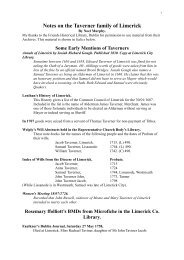

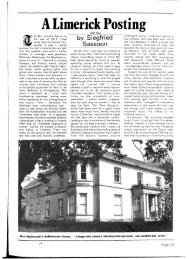
![The Galbally farmer [poem] by Darby Ryan - Limerick City Council](https://img.yumpu.com/24792577/1/190x260/the-galbally-farmer-poem-by-darby-ryan-limerick-city-council.jpg?quality=85)
